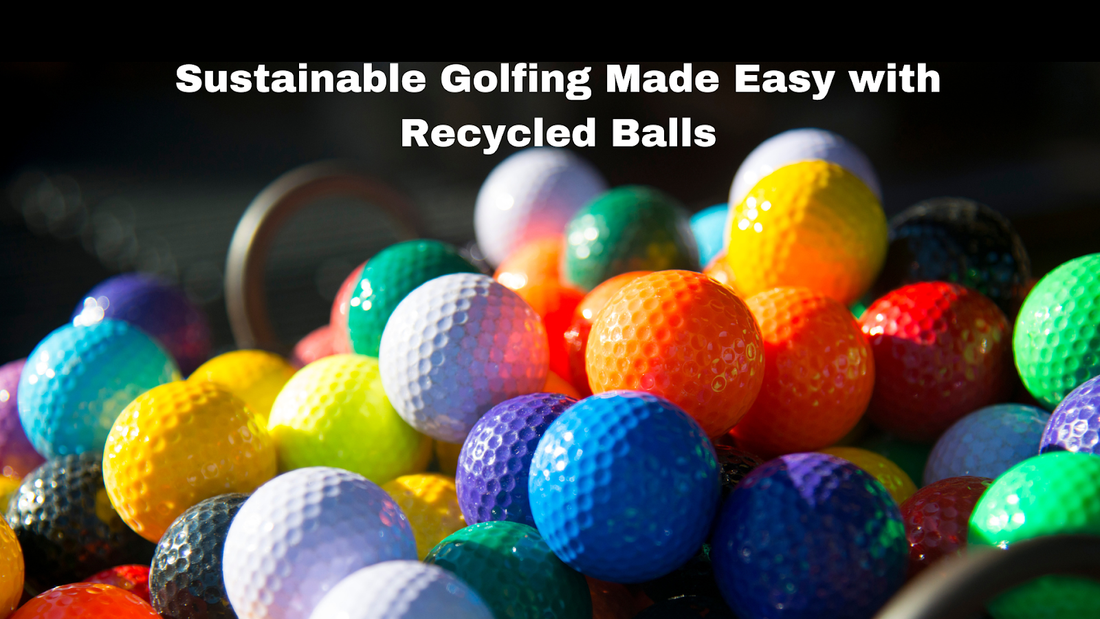
Sustainable Golfing Made Easy with Recycled Balls
The golf industry has long embraced innovation, but one of its most significant advancements in recent years is the growing popularity of recycled golf balls. Once considered a niche market, this sector has evolved into a thriving industry fueled by sustainability, cost-effectiveness, and technological improvements. This case study delves into the journey of recycled golf balls, exploring their environmental benefits, market expansion, and their role in creating a more sustainable future for the sport. Far from being just a passing trend, recycled golf balls are revolutionizing the game, proving to be both a smart choice for golfers and a game-changer for the industry.
The Problem: Golf’s Environmental Footprint
Golf is a sport deeply connected to nature, but its environmental impact has often been at odds with this image. One of the most pressing issues is the sheer number of golf balls lost or discarded each year. According to estimates, over 300 million golf balls are lost annually in the United States alone. Many of these balls end up in water hazards, forests, or landfills, where they can take hundreds of years to decompose. Made from materials like synthetic rubber and plastic, golf balls contribute to plastic pollution and harm ecosystems.
This problem sparked a question: Could these lost balls be given a second life? The answer was recycled golf balls.
The Solution: How Recycled Golf Balls Are Made
Recycled golf balls are collected, cleaned, and refurbished to meet high-quality standards. Here’s a step-by-step look at the process:
• Collection: Divers or specialized equipment retrieve lost golf balls from water hazards and roughs on golf courses. These balls are then sorted based on brand, model, and condition.
• Cleaning: The balls undergo a thorough cleaning process to remove dirt, algae, and other debris. Advanced techniques ensure that the balls look and feel like new.
• Grading: Each ball is inspected and graded based on its condition. Premium brands like Callaway golf balls and Titleist golf balls are often restored to near-original quality.
• Packaging and Resale: The refurbished balls are packaged and sold as recycled golf balls, offering players a cost-effective and eco-friendly alternative to new balls.
The Impact: Environmental and Economic Benefits
The rise of recycled golf balls has significantly benefited both the environment and the golf industry:
• Waste Reduction: By repurposing used golf balls, millions are kept out of landfills, protecting ecosystems and promoting sustainability. One company alone has diverted over 50 million golf balls in the past decade.
• Cost Savings: Golfers of all levels can save money with recycled golf balls. Beginners can practice without fear of losing costly balls, while seasoned players can find premium brands like Callaway golf balls and Titleist golf balls at a fraction of the price.
•Golf Course Revenue: Many courses now partner with recyclers to collect and resell balls, creating a new revenue stream while encouraging eco-friendly play. Some even offer discounts for returning lost balls.
The Market: A Growing Industry
The recycled golf balls market has seen remarkable growth in recent years. According to a report by Grand View Research, the global market was valued at $198.5 million in 2022 and is projected to grow at a CAGR of 4.5% through 2030. This growth is driven by several factors:
• Increased Environmental Awareness: Golfers and courses are prioritizing sustainability, making recycled golf balls a popular choice.
• Rising Golf Participation: The COVID-19 pandemic led to a surge in new players, many of whom are looking for affordable equipment like used golf balls.
• Technological Advancements: Improved cleaning and refurbishing techniques have enhanced the quality of recycled balls, making them nearly indistinguishable from new ones.
A Case Study: Success Stories in the Industry
One notable success story is golfballs.net, a leading retailer of recycled golf balls. Founded with a mission to provide high-quality, affordable golf balls while promoting sustainability, the company has become a trusted name in the industry. Here’s how they’ve made an impact:
• Wide Selection: golfballs.net offers a diverse range of recycled balls, from premium brands like Callaway golf balls and Titleist golf balls to budget-friendly options for beginners.
• Commitment to Quality: Each ball undergoes rigorous cleaning and grading to ensure it meets high standards.
• Sustainability Focus: By selling recycled balls, the company has helped divert millions of golf balls from landfills, contributing to a greener future for the sport.
The Future: A Greener Game
The success of recycled golf balls is a testament to the power of innovation and sustainability. As the golf industry continues to evolve, recycled balls are likely to play an even bigger role. Here’s what the future holds:
• Increased Adoption: More golf courses and tournaments are expected to embrace recycled balls as part of their sustainability initiatives.
•Technological Innovations: Advances in recycling technology will further improve the quality and performance of recycled balls.
• Broader Awareness: As players become more environmentally conscious, the demand for recycled golf balls will continue to grow.
Final Thoughts: A Win for Golf & the Planet
Recycled golf balls are more than just an eco-friendly choice. They reflect the golf industry’s shift toward sustainability and innovation. Players enjoy top-tier performance while reducing their environmental impact, and courses and retailers benefit from growing demand.
Ready to make the switch? Explore golfballs.net for a wide range of Callaway golf balls, Titleist golf balls, and the best golf balls for beginners. Join the movement for a greener game, because the future of golf is sustainable.

